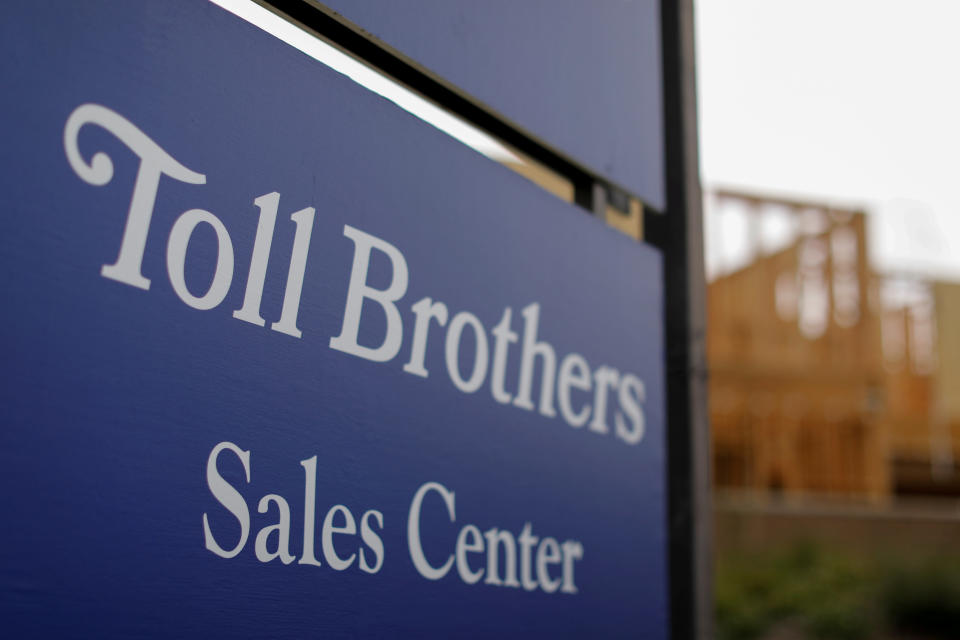What you need to know on Wednesday
It was a brutal trading session on Tuesday.
Stocks got hammered as trade fears resurfaced and rocked markets. The S&P 500 (^GSPC) fell 3.24%, or 90.31 points, as of market close, with banking stocks leading declines. The Dow (^DJI) slid 3.1%, or 799.36 points, nearing the lowest levels of the session. The industrial bellwether Caterpillar (CAT) was the index’s worst performer, falling 6.93% to $129.32 per share as uncertainty over U.S.-China trade policy continued to brew. The Nasdaq (^IXIC) fell 3.8%, or 283.08 points.
“Fear has really gripped the market as concerns over the trade war weren’t alleviated with the positive words exchanged by the U.S. and Chinese presidents over the weekend. What started off as a slow selloff really accelerated once a key technical level [in the S&P] was breached. Hopes of a Santa Claus rally seem less likely by the day given that the two most obvious catalysts — a more dovish Fed and an easing of tension in the trade war with China — have both already happened and to no avail,” Independent Advisor Alliance Chief Investment Officer Chris Zaccarelli told Yahoo Finance.
All major markets will be closed Wednesday for the National Day of Mourning to honor the passing of late President George H.W. Bush.

Federal Reserve Chairman Jerome Powell’s testimony before the Joint Economic Committee has been postponed to a later date. However, the Fed’s Beige Book will still be released at 2 p.m. ET on Wednesday as originally scheduled.
Google CEO Sundar Pichai was scheduled to testify before the House Committee on Wednesday, but that hearing will now take place on Tuesday, December 11.
Additionally, athleisure brand Lululemon (LULU) has rescheduled its third-quarter financial release from Wednesday to Thursday after the market close.
While there is economic data scheduled to be released on Wednesday, it is subject to change in light of the National Day of Mourning. Expected data includes the MBA mortgage applications for the week ending November 30, the ADP employment change for November and the ISM non-manufacturing index for November. Economists polled by Bloomberg are expecting U.S. private sector employment to have increased to 195,000 jobs from the 227,000 job in October and a reading of 59.1 for ISM non-manufacturing index for the month of November.
And here’s what caught markets correspondent Myles Udland’s eye …
The housing market recession is coming
In recent months, we’ve seen shares of homebuilder stocks get hammered. Existing and new home sales have declined sharply. And the pace of home price appreciation has now declined for six straight months.
The factors weighing on housing are not particularly new or novel — a lack of affordable housing supply and the rise in mortgage rates to seven-year highs are pressuring the market.
The latest data on homebuilder sentiment shows a sharp downturn in confidence during November with the NAHB’s housing market index falling by the most in 8.5 years. And recent earnings from one of the country’s most prominent homebuilders isn’t going to bolster sentiment in the space.
On Tuesday, Toll Brothers (TOL) called out weakness in California, the company’s highest revenue state. “California has seen the biggest decline,” Douglas Yearley, Jr., chairman and chief executive officer at Toll Brothers, said in the company’s quarterly earnings release. “Significant price appreciation over the past few years, fewer foreign buyers in certain communities, and the impact of rising interest rates all contributed to this slowdown.”
In 2017, California accounted for over $1.5 billion in revenue for Toll Brothers, the largest for any one of the company’s regions. (Toll counts California as a standalone region.)

Yearly added, “In our fourth quarter, despite a healthy economy, we saw a moderation in demand. Fourth quarter contracts declined 15% in dollars and 13% in units compared to a difficult comp from one year ago. Fourth quarter demand slowed to a per community pace more consistent with FY 2016’s fourth quarter, which was still strong.
“In November, we saw the market soften further, which we attribute to the cumulative impact of rising interest rates and the effect on buyer sentiment of well-publicized reports of a housing slowdown. We saw similar consumer behavior beginning in late 2013, when a rapid rise in interest rates temporarily tempered buyer demand before the market regained momentum.” Bloomberg notes this was the first decline in orders for the company since 2014.
On a day that stocks got hammered, however, Toll Brothers held up relatively well, falling 1.6% while the S&P 500 dropped more than 3%. So far this year, however, shares of Toll Brothers are down over 30%.
With a slowdown clearly coming to the housing sector, the question then becomes how much an ailing housing market will hamper the overall economy. The crash in oil prices and the resulting impact on markets and the economy seen back in 2014-15 could provide a potential roadmap, and an encouraging one for those who see the current expansion sustaining itself.
Cullen Roche, founder of Orcam Financial Group, floated the idea Monday that in 2015 we experienced an “undercover manufacturing recession” in the U.S., but that the overall economy kept growing due to increasing diversity within the economy. In 2020, Roche posits, we could see a similar dynamic play out with housing serving as the point of stress.
After oil prices crashed and oil-producing wells were shuttered across the country, we saw oil and gas production fall more than 60% while business investment dropped more than 30%. Investors also dealt with an earnings recession that resulted from declines in the energy sector and foreign economies that were pressured by a rapidly-strengthening U.S. dollar.
Oil prices eventually recovered, President Trump was elected president and vowed to cut corporate taxes, and thus was born a new leg of the economic expansion and the current bull run for stocks.
Of course, the housing market — which comprises a little less than 14% of GDP — is a larger part of the overall economy than the oil and gas industry (the mining sector constituted just under 2% of GDP in the second quarter of this year). Comparing housing and the oil industry is clearly not an apples to apples comparison, but this can serve as a potential guidepost for how the economy has reacted to recent stresses in one sector.
The drop in oil prices, we should also not forget, was a boon to consumer spending — with some economists estimating this amounted to a $60 billion tax break — which accounts for around 70% of GDP. As long as consumers remain in good shape, the economy is likely to hold up.
And though many consumers get a large part of their net worth and purchasing power from the value of their home, the current downturn in housing does not point to an outright decline in home values, but rather a moderation in the appreciation of home values. As Yearly said Tuesday, “equity in existing homes is at an all-time high, providing significant liquidity for current home owners who want to upgrade to a new home.”
Workers, particularly those in the lowest tiers of the income distribution, also continue to see their wages rise at the fastest pace since the financial crisis. Neither factor sounds like one that would prompt consumers to drastically rein in their spending.
Though as we noted Monday, financial markets are currently pricing in a downbeat overall economic forecast. After a brief reprieve for markets around optimism for easier Fed policy and a resolution of trade tensions, Tuesday’s action suggests this trend is still in place.
Current dynamics in the bond market are raising concerns among some investors, with the recent inversion at the front-end of the yield curve — with the yield on two- and three-year Treasuries exceeding the yield on 5-year notes — raising worries about recession.
And the softness that we’re seeing in the housing market isn’t likely to put at rest many of the economic concerns we’re seeing expressed in markets. But if recent history is anything to go by, there is a path for a slowdown in a big part of the economy to potentially come and go without an outright contraction in economic growth following. Though the market, it seems, remains somewhat wary of betting on that outcome.
Heidi Chung is a reporter at Yahoo Finance. Follow her on Twitter: @heidi_chung.
Follow Yahoo Finance on Twitter, Facebook, Instagram, Flipboard, LinkedIn, and reddit.
More from Heidi:
The U.S. has a secret weapon in the trade war: Nomura
The 10 U.S. cities with the highest economic confidence
Trump slams Fed Chair Powell, says he’s ‘not even a little bit happy’ with him
Trade uncertainty is ‘squelching business investments,’ JPMorgan strategist says

